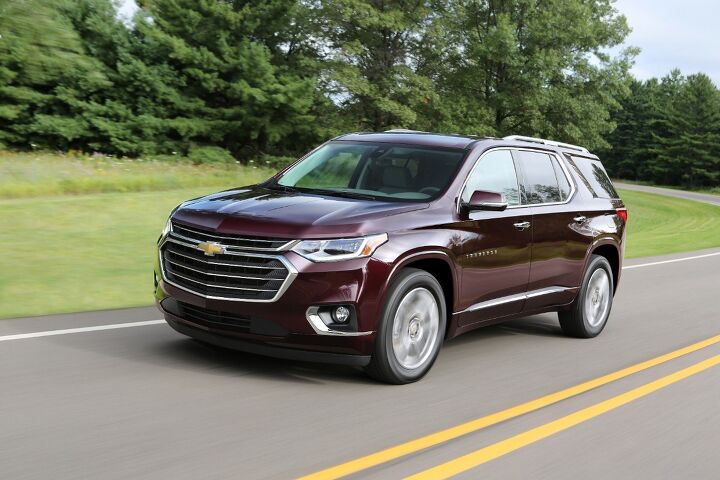GM to Sink More Cash Into Lansing Crossover Plant

On Monday, General Motors stated its intent to invest $36 million into Lansing Delta Township Assembly, maker of large crossovers since its inception.
Little info was provided on the details of the investment, and GM claims the cash won’t expand Lansing’s complement of 2,600 employees. GM CEO Mary Barra said the investment is needed to “prepare the plant for future crossover production.”
Let’s indulge in a little speculation.
“We are proud of the hard work and commitment of the entire Lansing team and the Chevrolet Traverse and Buick Enclave are important products in our growing crossover portfolio,” Barra said in a statement. The money is said to fund a mid-cycle refresh of the two models. Ho-hum. But where could GM take its quest to put crossovers in every driveway in America?
Lansing Delta Township, GM’s youngest domestic plant, is the ancestral home of the automaker’s largest unibody vehicles, opening in 2006 to build the automaker’s new Lambda-platform crossovers: Buick Enclave, Chevrolet Traverse, GMC Acadia, and Saturn Outlook. The plant has soaked up $600 million in investments over the past decade.
While down to two models since the Acadia’s departure, the plant is a busy one, running two shifts with overtime. The strong sales performance of the Enclave and especially the Traverse makes one wonder about a white space in GMC’s lineup: a vehicle larger than the now-midsize Acadia ( refreshed for the 2020) and the full-size, body on frame Yukon and Yukon XL. It’s not the only empty space in GMC’s stable, but it’s less talked about than the absence of a sub-Terrain crossover or an off-road focused model.
True, the Acadia is more of a gap-filler than the two-row Chevy Blazer, but there’s little doubt that a large, GMC crossover built atop the platform shared by the Enclave and Traverse would sell well; the Traverse was the third best-selling Chevy-badged vehicle last year, unloading 146,534 units in the United States. Meanwhile, GMC’s Denali sub-brand is a license to print money. It’s worth noting that, in the waning days of 2018, GM trademarked the Envoy name, which might not signify anything other than the General wanting to keep a defunct model name in the family.
Beyond this thin gruel, there’s no indication GMC has any intention of going “big” on new product. Brand boss Duncan Aldred stated in the past that the lower end of the ladder is the “logical” place for new model introductions.
The automaker’s preemptive response to questions arising from its LDT plant investment is, “For competitive reasons, GM is not disclosing specifics or timing related to the plant’s future products at this time.”
[Image: General Motors]

More by Steph Willems
Latest Car Reviews
Read moreLatest Product Reviews
Read moreRecent Comments
- Oberkanone Tesla license their skateboard platforms to other manufacturers. Great. Better yet, Tesla manufacture and sell the platforms and auto manufacturers manufacture the body and interiors. Fantastic.
- ToolGuy As of right now, Tesla is convinced that their old approach to FSD doesn't work, and that their new approach to FSD will work. I ain't saying I agree or disagree, just telling you where they are.
- Jalop1991 Is this the beginning of the culmination of a very long game by Tesla?Build stuff, prove that it works. Sell the razors, sure, but pay close attention to the blades (charging network) that make the razors useful. Design features no one else is bothering with, and market the hell out of them.In other words, create demand for what you have.Then back out of manufacturing completely, because that's hard and expensive. License your stuff to legacy carmakers that (a) are able to build cars well, and (b) are too lazy to create the things and customer demand you did.Sit back and cash the checks.
- FreedMike People give this company a lot of crap, but the slow rollout might actually be a smart move in the long run - they can iron out the kinks in the product while it's still not a widely known brand. Complaints on a low volume product are bad, but the same complaints hit differently if there are hundreds of thousands of them on the road. And good on them for building a plant here - that's how it should be done, and not just for the tax incentives. It'll be interesting to see how these guys do.
- Buickman more likely Dunfast.


































Comments
Join the conversation
1999 18,315 2000 50,786 2001 34,710 2002- 29,042 2003 26,259 2004 - 20,010 2005 16,283 Yep-the market really loved the Excursion-just look at the massive sales numbers.....:)
If they're running two shifts with overtime, I'd be curious to know how that translates to plant optimization, since that seems to be a large part of the plant closure equation.